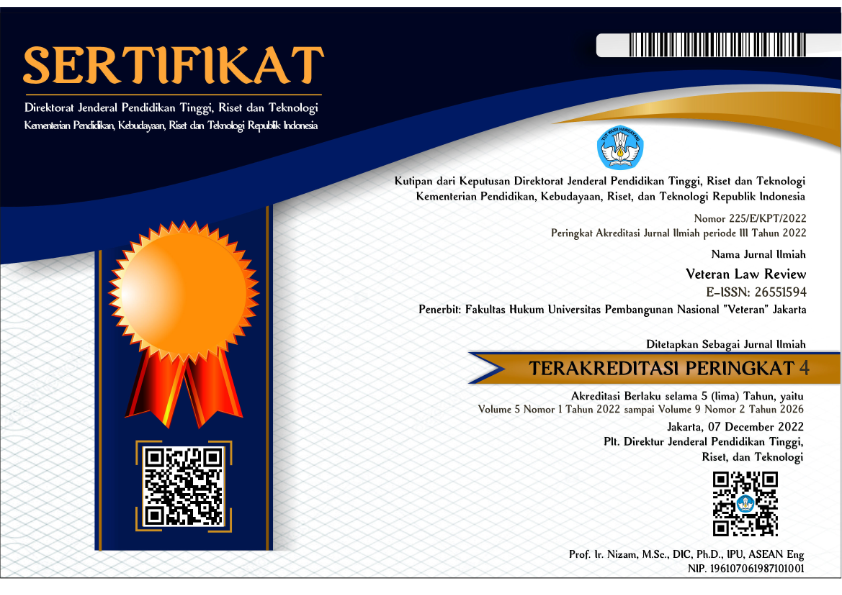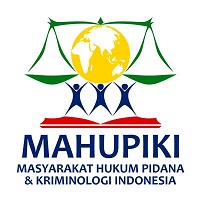Inclusion of The Exoneration Clause in The Agreement as an Unlawful Action
(Study of Decision Number 930 K/Pdt/2019)
DOI:
https://doi.org/10.35586/velrev.v6i2.6489Keywords:
Exconeration Clause, Agreement, TortAbstract
In Decision Number 898/Pdt.G/2016/PN.Jkt.Sel, ruled that the Plaintiff's lawsuit was vague and unacceptable because it had confused default with tort claims. Meanwhile, at the appeal level of the Decision, the Jakarta High Court through Decision Number 164/Pdt/2018/PT.DKI. which was upheld at the cassation level through Decision Number 930 K/PDT/2019, granted the cancellation of the exoneration clause on the grounds of default and not on the basis of tort. So it is interesting to discuss the inclusion of an exoneration clause in an agreement as a tort. To answer this, the research method used is juridical-normative legal research. The results of the study show that in applying for the cancellation of the exoneration clause through a tort lawsuit, in the posita section of the lawsuit the plaintiff must first describe the elements of a tort as follows: Unlawful Act, Fault, Loss and. Regarding the stipulation of the exoneration clause in the Agreement, the Panel of Judges in Decision Number 930 K/Pdt/2019 erred in their consideration that the exoneration clause that had been made in a standard manner by the Defendant which excluded or released the Defendant from claims and/or responsibilities was declared invalid. This is because if the Defendant did not want to accept the Plaintiff's claim, the Defendant should have made such a selection by requiring the Plaintiff to undergo a medical check-up first. Without a medical check-up, then when the Plaintiff suddenly became ill and the Defendant did not want to cover it, it can be interpreted that the Defendant did not act in good faith and committed an unlawful act rather than a default.
Downloads
References
Journal Articles:
Abidarini, Lutfira. (2021). "Keberlakuan Perjanjian Kredit Menggunakan Akta Pemberian Hak Tanggungan Atas Objek Harta Bersama Yang Cacat Hukum (Putusan Mahkamah Agung Republik Indonesia Nomor: 224K/PDT/2020)." Indonesian Notary 3.3
Bandem, I. Wayan, Wayan Wisadnya, and Timoteus Mordan. (2020). "Akibat Hukum Perbuatan Wanprestasi dalam Perjanjian Hutang-Piutang." Jurnal Ilmiah Raad Kertha 3.1
Benuf, Kornelius, and Muhamad Azhar. (2020). "Metodologi penelitian hukum sebagai instrumen mengurai permasalahan hukum kontemporer." Gema Keadilan 7.1
Djatmiko, Andreas Andrie, Fury Setyaningrum, and Rifana Zainudin. (2022). "Implementasi Bentuk Ganti Rugi Menurut Burgelijk Wetboek (Kitab Undang-Undang Hukum Perdata) Indonesia." Nomos: Jurnal Penelitian Ilmu Hukum 2.1
Manumpil, Jein Stevany. (2016). "Klausula Eksonerasi Dalam Hukum Perlindungan Konsumen Di Indonesia." Lex Privatum 4.3.
Roesli, Muhammad, Sarbini Sarbini, and Bastianto Nugroho. (2019). "Kedudukan perjanjian baku dalam kaitannya dengan asas kebebasan berkontrak." DiH: Jurnal Ilmu Hukum 15.1
Sarjana, Made. (2016). "Pembatasan Klausula Eksonerasi." NOTARIIL Jurnal Kenotariatan 1.1
Syamsudin, Muhamad, And Fera Aditias Ramadani. (2018). "Perlindungan Hukum Konsumen Atas Penerapan Klausula Baku." Jurnal Yudisial 11.1
Zakiyah. (2018). "Klausula Eksonerasi dalam Perspektif Perlindungan Konsumen." Al-Adl: Jurnal Hukum 9.3
Books with an author:
Konoras, Abdurrahman. 2007, Aspek Hukum Penyelesaian Sengketa Secara Mediasi di Pengadilan-Rajawali Pers. Jakarta: RajaGrafindo Persada.
Shofie, Yusuf. 2018. Kapita Selekta Hukum Perlindungan Konsumen Di Indonesia. Bandung: Citra Aditya Bakti
Zulham, 2017. Hukum Perlindungan Konsumen. Jakarta: Prenada Media
Downloads
Published
How to Cite
Issue
Section
License
Copyright (c) 2023 Veteran Law Review

This work is licensed under a Creative Commons Attribution-ShareAlike 4.0 International License.
Copyright (c) 2022 Veteran Law Review Journal
Veteran Law Review © 2022 by Faculty of Law Universitas Pembangunan Nasional "Veteran" Jakarta is licensed under Creative Commons Attribution 4.0 International

1. License
The non-commercial use of the article will be governed by the Creative Commons Attribution license as currently displayed on Creative Commons Attribution 4.0 International.
2. Author(s)' Warranties
The author warrants that the article is original, written by the stated author(s), has not been published before, contains no unlawful statements, does not infringe the rights of others, is subject to copyright that is vested exclusively in the author, and free of any third party rights, and that any necessary written permissions to quote from other sources have been obtained by the author(s).
3. User/Public Rights
VELREV's spirit is to disseminate articles published are as free as possible. Under the Creative Commons Attribution-ShareAlike 4.0 International License. VELREV permits users to copy, distribute, display, and perform the work for non-commercial purposes only. Users will also need to attribute authors and VELREV to distributing works in the journal and other media of publications.
4. Rights of Authors
Authors retain all their rights to the published works, such as (but not limited to) the following rights;
- Reproduce the work
- Prepare derivative works based upon the work
- Distribute copies of the work
- Perform the work publicly
- Display the work publicly
- Copyright and other proprietary rights relating to the article, such as patent rights,
- The right to self-archive the article,
- The right to enter into separate, additional contractual arrangements for the non-exclusive distribution of the article's published version (e.g., post it to an institutional repository or publish it in a book), with an acknowledgement of its initial publication in this journal (Veteran Law Review).
5. Co-Authorship
If the article was jointly prepared by more than one author, any author submitting the manuscript warrants that he/she has been authorized by all co-authors to be agreed on this copyright and license notice (agreement) on their behalf, and agrees to inform his/her co-authors of the terms of this policy. VELREV will not be held liable for anything that may arise due to the author's internal dispute. VELREV will only communicate with the corresponding author.
6. Royalties
Being an open accessed journal and disseminating articles for free under the Creative Commons license term mentioned, author(s) are aware that VELREV entitles the author(s) to no royalties or other fees.
7. Miscellaneous
VELREV will publish the article (or have it published) in the journal if the article’s editorial process is successfully completed. JOSI's editors may modify the article to a style of punctuation, spelling, capitalization, referencing, and usage that deems appropriate. The author acknowledges that the article may be published so that it will be publicly accessible and such access will be free of charge for the readers as mentioned in point 3.

















